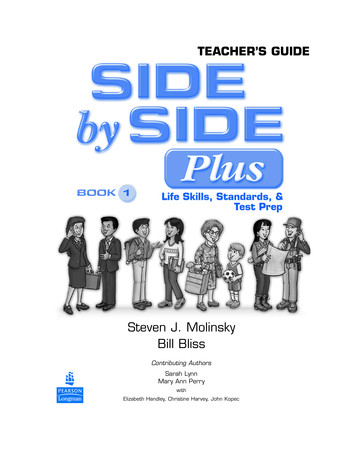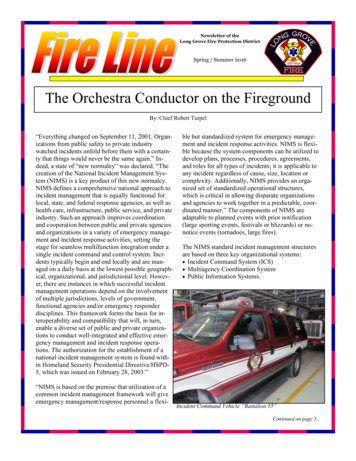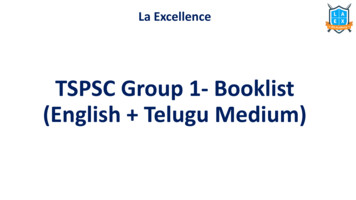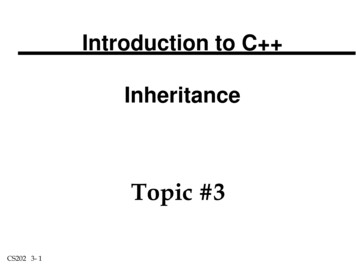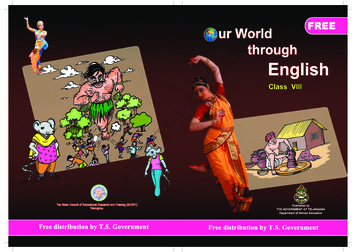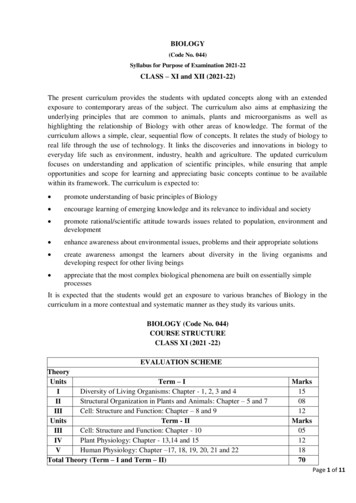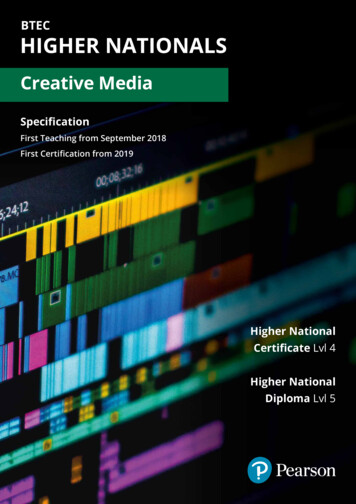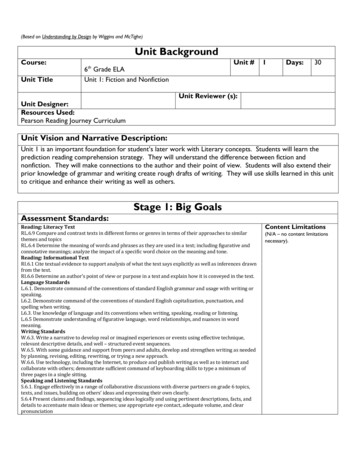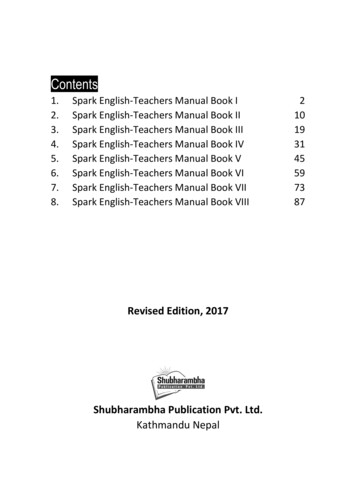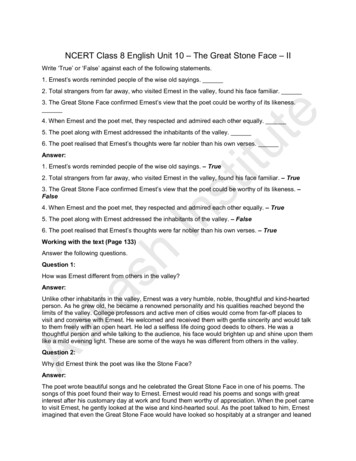
Transcription
NCERT Class 8 English Unit 10 – The Great Stone Face – IIWrite ‘True’ or ‘False’ against each of the following statements.1. Ernest’s words reminded people of the wise old sayings.2. Total strangers from far away, who visited Ernest in the valley, found his face familiar.ute3. The Great Stone Face confirmed Ernest’s view that the poet could be worthy of its likeness.4. When Ernest and the poet met, they respected and admired each other equally.5. The poet along with Ernest addressed the inhabitants of the valley.6. The poet realised that Ernest’s thoughts were far nobler than his own verses.Answer:tit1. Ernest’s words reminded people of the wise old sayings. – True2. Total strangers from far away, who visited Ernest in the valley, found his face familiar. – TrueIns3. The Great Stone Face confirmed Ernest’s view that the poet could be worthy of its likeness. –False4. When Ernest and the poet met, they respected and admired each other equally. – True5. The poet along with Ernest addressed the inhabitants of the valley. – False6. The poet realised that Ernest’s thoughts were far nobler than his own verses. – TrueWorking with the text (Page 133)Question 1:shAnswer the following questions.How was Ernest different from others in the valley?kaAnswer:AaUnlike other inhabitants in the valley, Ernest was a very humble, noble, thoughtful and kind-heartedperson. As he grew old, he became a renowned personality and his qualities reached beyond thelimits of the valley. College professors and active men of cities would come from far-off places tovisit and converse with Ernest. He welcomed and received them with gentle sincerity and would talkto them freely with an open heart. He led a selfless life doing good deeds to others. He was athoughtful person and while talking to the audience, his face would brighten up and shine upon themlike a mild evening light. These are some of the ways he was different from others in the valley.Question 2:Why did Ernest think the poet was like the Stone Face?Answer:The poet wrote beautiful songs and he celebrated the Great Stone Face in one of his poems. Thesongs of this poet found their way to Ernest. Ernest would read his poems and songs with greatinterest after his customary day at work and found them worthy of appreciation. When the poet cameto visit Ernest, he gently looked at the wise and kind-hearted soul. As the poet talked to him, Ernestimagined that even the Great Stone Face would have looked so hospitably at a stranger and leaned
forward to listen to their conversation. In due course, the poet pointed out that Ernest was indeedreading the poems written by him. After reading his poems, Ernest was convinced that the poet hada likeness to the Great Stone Face.Question 3:What did the poet himself say about his thoughts and poems?Answer:Question 4:titWhat made the poet proclaim Ernest was the Stone Face?uteWhen the poet talked with a man like Ernest who was so wise, gentle and kind, he felt as though hecould hear a distant voice of a heavenly song from his views and simple thoughts. The poet stronglyfelt that his own life did not correspond to his thoughts although he had grand dreams, but he couldnever convert those to reality. The poet lacked faith in his own thoughts as he talked sadly to Ernestwith teary eyes. He confessed that he was not worthy to be compared to the likeness of the GreatStone Face as his actions did not match his thoughts.Answer:Question 5:shInsThe poet and Ernest had a long conversation when they met. They went to a meeting place togetherwhere Ernest addressed the audience. The poet heard him speak and realised that Ernest’s wordsand thoughts have great depth and wisdom. He led a life of good deeds and selfless love towardswhomever he was in touch with. As Ernest talked, at a distance along with the golden light of thesetting sun, the Great Stone Face appeared with white mists around it just like the white hairsaround the brow of Ernest. At that moment, Ernest’s face took on an expression so grand that thepoet was moved and proclaimed that Ernest held a striking resemblance to the Great Stone Face.The audience also looked and consented that the poet was indeed correct in his observation. Thus,the old prophecy was fulfilled.Write ‘Ernest’ or ‘Poet’, against each statement below.(i) There was a gap between his life and his words.ka(ii) His words had the power of truth as they agreed with his thoughts.(iii) His words were as soothing as a heavenly song but only as useful as a vague dream.(iv) His thoughts were worthy.(v) Whatever he said was truth itself.Aa(vi) His poems were noble.(vii) His life was nobler than all the poems.(viii) He lacked faith in his own thoughts.(ix) His thoughts had power as they agreed with the life he lived.(x) Greatness lies in truth. Truth is best expressed in one’s actions. He was truthful, therefore he wasgreat.Answer:1. Poet
e2.3.4.5.6.7.8.9.10.Question 6:(i) Who, by common consent, turned out to be like the Great Stone Face?(ii) Did Ernest believe that the old prophecy had come true? What did he say about it?Answer:tit(i) Ernest turned out to be like the Great Stone Face by common consent. He looked very wise,gentle and kind just like the Great Stone Face.Ins(ii) No, Ernest did not believe that the old prophecy had come true. Although everyone in theaudience consented that he had the likeness of the Great Stone Face, he hoped that some wiserand better man than himself would appear someday who would have a striking resemblance to theGreat Stone Face.Working with language (Page 133-135)Question 1:Mark the meaning that best fits the word or a phrase in the story.sh(i) (sun) going down(a) becoming smaller(b) weakening(c) settingka(ii) brightening(a) making (it) look bright and cheerful(b) lending (it) a special glowAa(c) causing (it) to appear hopeful(iii) spacious(a) lonely and wild(b) big and wide(c) special and important(iv) prophecy(a) proverb(b) prediction
(c) rumour(v) marvellous(a) wonderful(b) surprising(c) shocking(vi) proclaimute(a) reveal(b) declare(c) shout(vii) ceasetit(a) happen(b) stop(viii) (a night’s) shelter(a) stay(b) safety(c) hospitality(ix) gazedIns(c) remain(b) stared at(c) thought ofsh(a) wandered aboutka(x) took on (an expression)(a) challenged(b) resembled(c) assumedAaAnswer:(i) (sun) going down(c) setting(ii) brightening(b) lending (it) a special glow(iii) spacious(b) big and wide(iv) prophecy
(b) prediction(v) marvellous(a) wonderful(vi) proclaim(b) declare(vii) ceaseute(b) stop(viii) (a night’s) shelter(a) stay(ix) gazedtit(b) stared at(x) took on (an expression)Question 2:(i) Read the following sentences.(a) I do hope I’ll live to see him.Ins(c) assumed(b) He will come! Fear not, Ernest; the man will come.(c) Gathergold is arriving tomorrow, people said.sh(d) Blood-and-Thunder starts his journey back to the valley next week, everyone proclaimed.(e) The great man is going to spend his old age in his native town.kaNotice that in the above sentences, verbs in bold type are in four different forms, denoting fourimportant ways of expressing future time. None of these can be said to be exclusively used to showfuture time, though each is used to refer to some action in future.(ii) Which form of the verb is more natural in these sentences? Encircle your choice.(a) I’m not free this evening. I will work/am working on a project.Aa(b) Have you decided where you will go for your higher secondary? Yes, I have. I will go/amgoing to the Kendriya Vidyalaya.(c) Don’t worry about the dog. It won’t hurt/isn’t hurting you.(d) The weatherman has predicted that it will snow/is snowing in Ranikhet tonight.(e) Swapna can’t go out this evening. Her father will come/is coming to see her.Answer:(i) Attempt it yourself by reading the sentences carefully.(ii) (a) I’m not free this evening. I will work/am working on a project.I’m not free this evening. I am working on a project.
(b) Have you decided where you will go for your higher secondary? Yes, I have. I will go/amgoing to the Kendriya Vidyalaya.Have you decided where you will go for your higher secondary? Yes, I have. I will go to theKendriya Vidyalaya.(c) Don’t worry about the dog. It won’t hurt/isn’t hurting you.Don’t worry about the dog. It won’t hurt you.ute(d) The weatherman has predicted that it will snow/is snowing in Ranikhet tonight.The weatherman has predicted that it will snow in Ranikhet tonight.(e) Swapna can’t go out this evening. Her father will come/is coming to see her.Swapna can’t go out this evening. Her father is coming to see her.Question 3:(a) Rani : Why are you turning on the radio?InsRavi : I (listen) to the news.tit(i) Complete these pieces of conversation using will or going to with the verbs given.(b) Rani : Oh, I can’t buy this book. I have no money.Ravi : Don’t worry. I (lend) you some.(c) Rani : Look at those dark clouds.Ravi : I think it (rain).(d) Rani : What shall we have for dinner?shRavi : I can’t decide.Rani : Make up your mind.Ravi : All right, then. We (have) fried rice and dry beans.ka(e) Rani : Why are you filling the kettle with water?Ravi : I (make) coffee.(f) Rani : We need some bread and butter for breakfast.Ravi : All right. I (go) to the bakery and get some.Aa(Before he goes out, Ravi talks to their father.)Ravi : I (get) some bread and butter. Do you want anything from the bakery?Father : Yes, I want some salt biscuits.Ravi : Fine, I (get) you a packet.(ii) Let pairs of children take turns to speak aloud the dialogues.Answer:(i) (a) Rani : Why are you turning on the radio?Ravi : I am going to listen to the news.
(b) Rani : Oh, I can’t buy this book. I have no money.Ravi : Don’t worry. I will lend you some.(c) Rani : Look at those dark clouds.Ravi : I think it is going to rain.(d) Rani : What shall we have for dinner?Rani : Make up your mind.ituteRavi : I can’t decide.Ravi : All right, then. We will have fried rice and dry beans.(e) Rani : Why are you filling the kettle with water?Ravi : I am going to make coffee.(f) Rani : We need some bread and butter for breakfast.(Before he goes out, Ravi talks to their father.)stRavi : All right. I will go to the bakery and get some.Ravi : I am going to get some bread and butter. Do you want anything from the bakery?Ravi : Fine, I will get you a packet.(ii) Attempt yourself.InFather : Yes, I want some salt biscuits.Question 1:shSpeaking and writing (Page 135-136)Each of the following words has the sound/f/ as in feel. The words on the left have it initially. Thoseon the right have it finally. Speak each word weddeaffaststiffAaAnswer:Attempt it yourself.Question 2:Underline the letter or letters representing/f/in each of the following words.filesloughfaintliftcoughdefenceaffordenough
phistryQuestion 3:stImagine that you are the poet. You have come to your native valley to meet a famous preachercalled Ernest. Narrate the incident of your first meeting with him.Answer:Attempt it yourself.InQuestion 4:(i) Put each of the following in the correct order to construct sentences. a resident of Noida near Delhi,/is visually impaired/George Abraham,shconfidence and competitive spirit/and infuses discipline among the participants/It provides kahe has helped/The brain behind the World Cup Cricket,/the disabled to dream Aato the blind school in Delhi/It was a chance visit/that changed his life sport is a powerful tool/the disabled/He believes that/for rehabilitation of (ii) Now rearrange the sentences above to construct a paragraph.
George Abraham,Answer:itute(i)a resident of Noida near Delhi,/is visually impaired/George Abraham, George Abraham, a resident of Noida near Delhi, is visually impaired confidence and competitive spirit/and infuses discipline among the participants/It provides It provides confidence and competitive spirit and infuses discipline among the participants he has helped/The brain behind the World Cup Cricket,/the disabled to dream The brain behind the World Cup Cricket, he has helped the disabled to dream to the blind school in Delhi/It was a chance visit/that changed his life It was a chance visit to the blind school in Delhi that changed his life sport is a powerful tool/the disabled/He believes that/for rehabilitation ofst He believes that sport is a powerful tool for rehabilitation of the disabled(ii) George Abraham, a resident of Noida near Delhi, is visually impaired. The brain behind the WorldIn Cup Cricket, he has helped the disabled to dream. It was a chance visit to the blind school in Delhithatshchanged his life. He believes that sport is a powerful tool for rehabilitation of the disabled. It providesAakaconfidence and competitive spirit and infuses discipline among the participants.
the old prophecy was fulfilled. Question 5: Write 'Ernest' or 'Poet', against each statement below. (i) There was a gap between his life and his words. (ii) His words had the power of truth as they agreed with his thoughts. (iii) His words were as soothing as a heavenly song but only as useful as a vague dream. (iv) His thoughts were .
